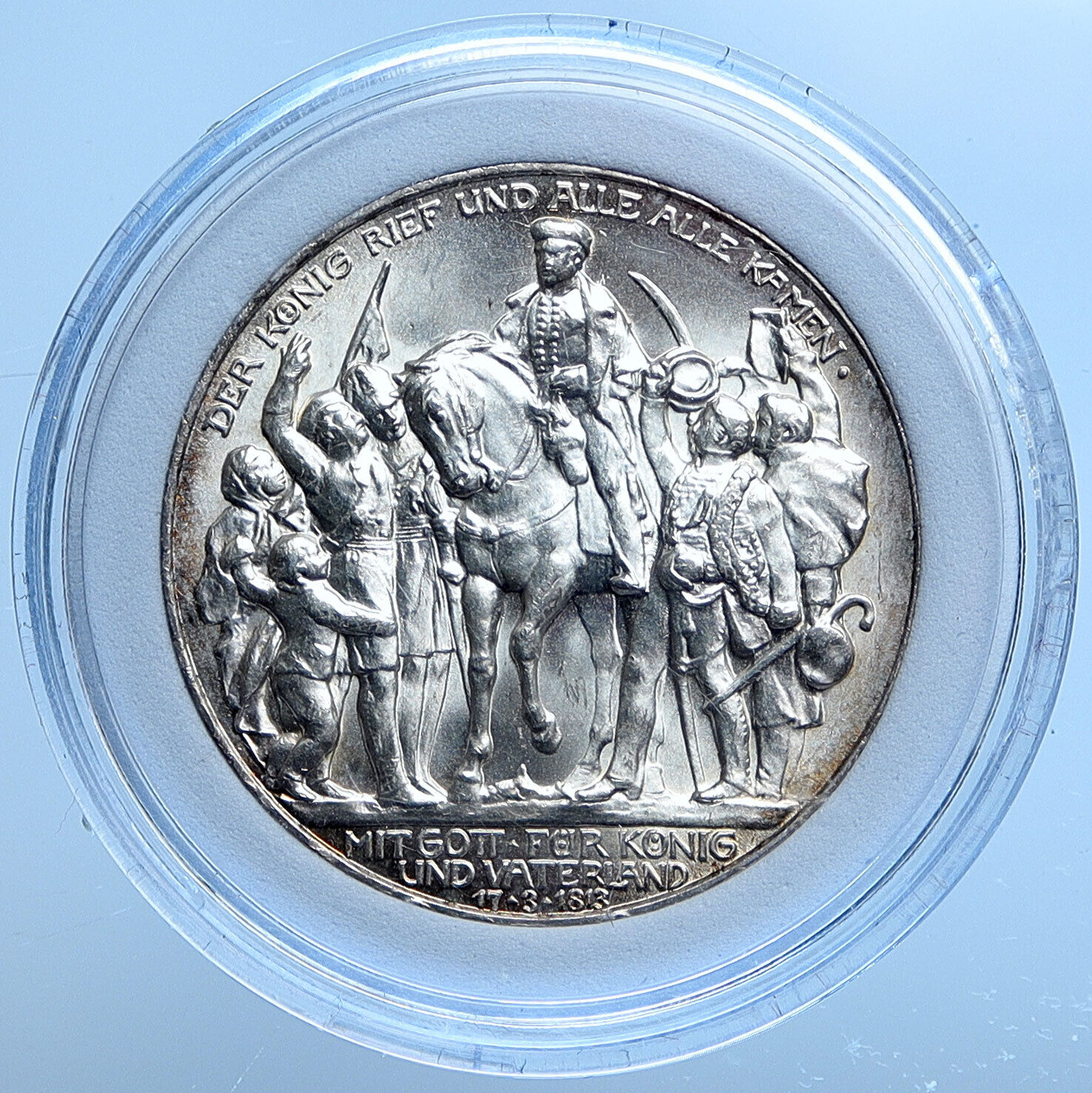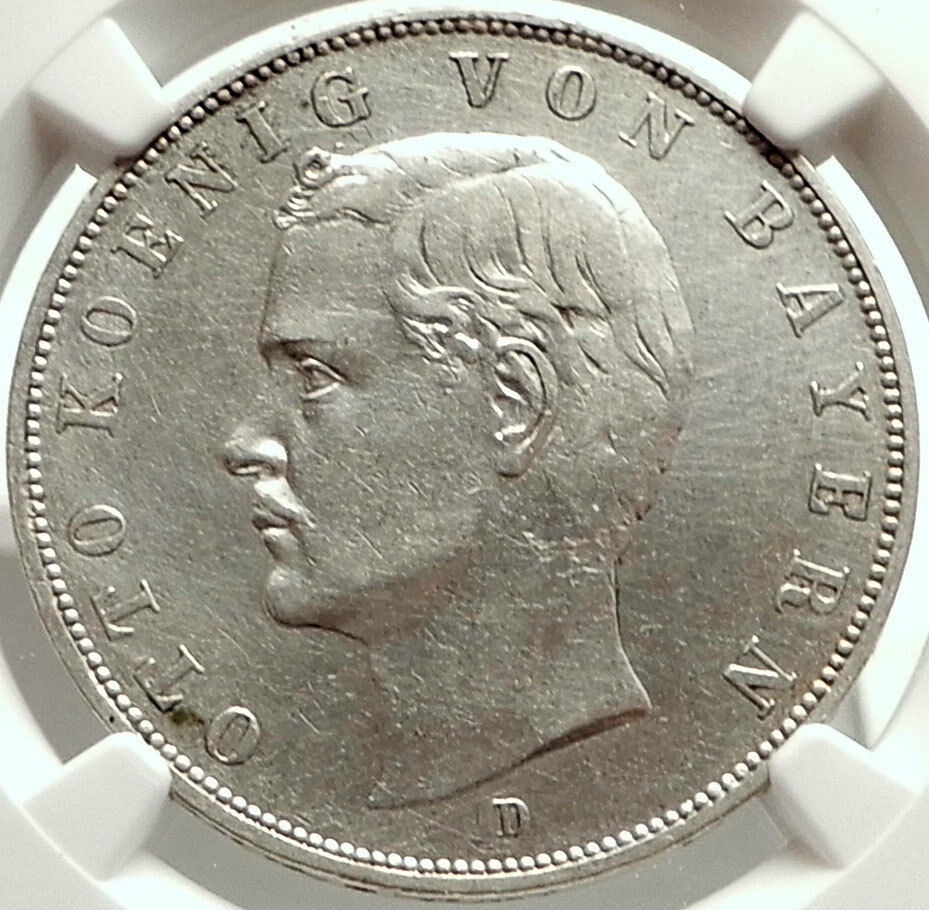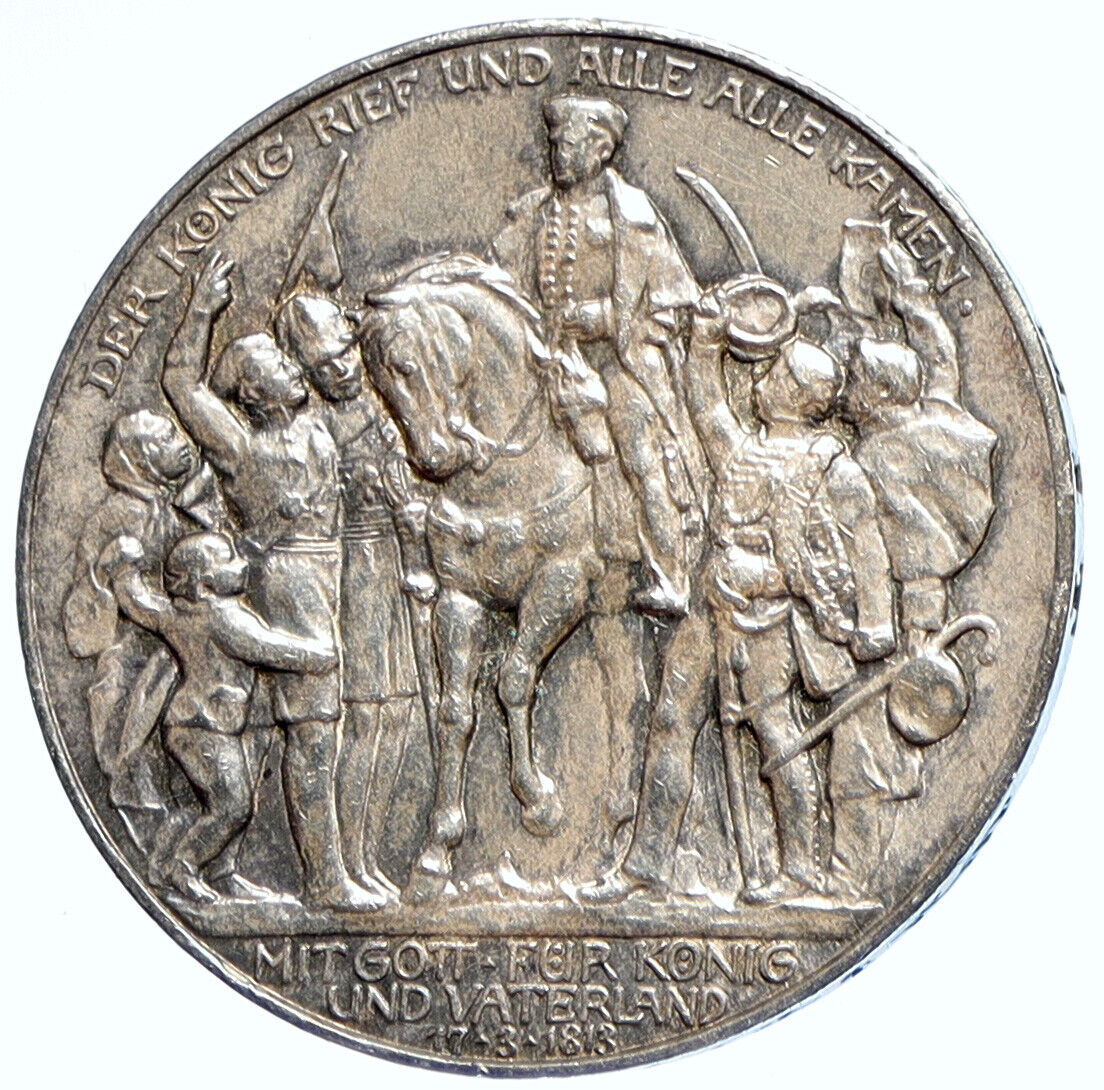|
Germany. German States. Wurttemburg
Wilhelm II – King of Württemberg: 6 October 1891 – 30 November 1918
Silver Wedding Anniversary Commemorative issue
1911 F Silver 3 Mark 33mm (16.67 grams) 0.900 Silver (0.4823 oz. ASW)
Referffence: KM# 636
Certification: NGC MS 65 3837930-002
WILHELM II·UND·CHARLOTTE·VON·WÜRTTEMBERG·1886-1911·F, Adjoined busts facing right.
DEUTSCHES REICH 1911 * DREI MARK * around crowned eagle with shield on chest.
Wuttemburg was lockated in South Germany between Baden and Bavaria.
You are bidding on the exact item pictured, provided with a Certificate of Authenticity and Lifetime Guarantee of Authenticity.
 William II (German: Wilhelm II; 25 February 1848 – 2 October 1921) was the last King of Württemberg. He ruled from 6 October 1891 until the abolition of the kingdom on 30 November 1918. William II (German: Wilhelm II; 25 February 1848 – 2 October 1921) was the last King of Württemberg. He ruled from 6 October 1891 until the abolition of the kingdom on 30 November 1918.
 Princess Charlotte of Schaumburg-Lippe (10 October 1864-16 July 1946) was the daughter of Prince Wilhelm Karl August of Schaumburg-Lippe, and his wife, Princess Bathildis of Anhalt-Dessau. As the second wife of King William II of Württemberg she became Queen consort of Württemberg. She was not only the last queen of Württemberg, but the last surviving queen of any German state. Princess Charlotte of Schaumburg-Lippe (10 October 1864-16 July 1946) was the daughter of Prince Wilhelm Karl August of Schaumburg-Lippe, and his wife, Princess Bathildis of Anhalt-Dessau. As the second wife of King William II of Württemberg she became Queen consort of Württemberg. She was not only the last queen of Württemberg, but the last surviving queen of any German state.
Marriage
On 8 April 1886 she married the heir to the throne of the Kingdom of Württemberg, Crown Prince Wilhelm, who succeeded in 1891 as King William II of Württemberg (Wilhelm II. von Württemberg).[1] She was his second wife, and like her predecessor Princess Marie of Waldeck and Pyrmont was held to be of no political consequence. If the marriage had taken place for reasons of state – Wilhelm had no male heir – it was a miscalculation, as Charlotte produced no children.
As a princess of Württemberg she lived initially in Ludwigsburg and Stuttgart, but as queen in the Wilhelmspalais in Stuttgart. From June to October the royal couple moved to their residence at Friedrichshafen. Finally in November/December Wilhelm and Charlotte regularly took a two-week hunting holiday in Schloss Bebenhausen (the former Bebenhausen Abbey) at Bebenhausen near Tübingen, which after the revolution of 1918 became Charlotte’s permanent home.
In 1890, William brought his new wife to England, where the Duchess of York commented, “We liked Charlotte very much, she is a good honest soul tho’ rather too brusque, she seems to get on well with all the members of the Württemberg family which denotes great tact”.
 Germany, officially the Federal Republic of Germany is a federal parliamentary republic in western-central Europe. It includes 16 constituent states and covers an area of 357,021 square kilometres (137,847 sq mi) with a largely temperate seasonal climate. Its capital and largest city is Berlin. With 81 million inhabitants, Germany is the most populous member state in the European Union. After the United States, it is the second most popular migration destination in the world. Germany, officially the Federal Republic of Germany is a federal parliamentary republic in western-central Europe. It includes 16 constituent states and covers an area of 357,021 square kilometres (137,847 sq mi) with a largely temperate seasonal climate. Its capital and largest city is Berlin. With 81 million inhabitants, Germany is the most populous member state in the European Union. After the United States, it is the second most popular migration destination in the world.
 Various Germanic tribes have occupied northern Germany since classical antiquity. A region named Germania was documented before 100 CE. During the Migration Period the Germanic tribes expanded southward. Beginning in the 10th century, German territories formed a central part of the Holy Roman Empire. During the 16th century, northern German regions became the centre of the Protestant Reformation. Various Germanic tribes have occupied northern Germany since classical antiquity. A region named Germania was documented before 100 CE. During the Migration Period the Germanic tribes expanded southward. Beginning in the 10th century, German territories formed a central part of the Holy Roman Empire. During the 16th century, northern German regions became the centre of the Protestant Reformation.
The rise of Pan-Germanism inside the German Confederation resulted in the unification of most of the German states in 1871 into the Prussian-dominated German Empire. After World War I and the German Revolution of 1918-1919, the Empire was replaced by the parliamentary Weimar Republic. The establishment of the Third Reich in 1933 led to World War II and the Holocaust. After 1945, Germany split into two states, East Germany and West Germany. In 1990, the country was reunified.
 In the 21st century, Germany is a great power and has the world’s fourth-largest economy by nominal GDP, as well as the fifth-largest by PPP. As a global leader in several industrial and technological sectors, it is both the world’s third-largest exporter and importer of goods. Germany is a developed country with a very high standard of living sustained by a skilled and productive society. It upholds a social security and universal health care system, environmental protection and a tuition free university education. In the 21st century, Germany is a great power and has the world’s fourth-largest economy by nominal GDP, as well as the fifth-largest by PPP. As a global leader in several industrial and technological sectors, it is both the world’s third-largest exporter and importer of goods. Germany is a developed country with a very high standard of living sustained by a skilled and productive society. It upholds a social security and universal health care system, environmental protection and a tuition free university education.
Germany was a founding member of the European Union in 1993. It is part of the Schengen Area, and became a co-founder of the Eurozone in 1999. Germany is a member of the United Nations, NATO, the G8, the G20, and the OECD. The national military expenditure is the 9th highest in the world. Known for its rich cultural history, Germany has been continuously the home of influential artists, philosophers, musicians, sportsmen, entrepreneurs, scientists and inventors.
|









 William II (German: Wilhelm II; 25 February 1848 – 2 October 1921) was the last King of Württemberg. He ruled from 6 October 1891 until the abolition of the kingdom on 30 November 1918.
William II (German: Wilhelm II; 25 February 1848 – 2 October 1921) was the last King of Württemberg. He ruled from 6 October 1891 until the abolition of the kingdom on 30 November 1918.  Princess Charlotte of Schaumburg-Lippe (10 October 1864-16 July 1946) was the daughter of Prince Wilhelm Karl August of Schaumburg-Lippe, and his wife, Princess Bathildis of Anhalt-Dessau. As the second wife of King William II of Württemberg she became Queen consort of Württemberg. She was not only the last queen of Württemberg, but the last surviving queen of any German state.
Princess Charlotte of Schaumburg-Lippe (10 October 1864-16 July 1946) was the daughter of Prince Wilhelm Karl August of Schaumburg-Lippe, and his wife, Princess Bathildis of Anhalt-Dessau. As the second wife of King William II of Württemberg she became Queen consort of Württemberg. She was not only the last queen of Württemberg, but the last surviving queen of any German state.  Germany, officially the Federal Republic of Germany is a federal parliamentary republic in western-central Europe. It includes 16 constituent states and covers an area of 357,021 square kilometres (137,847 sq mi) with a largely temperate seasonal climate. Its capital and largest city is Berlin. With 81 million inhabitants, Germany is the most populous member state in the European Union. After the United States, it is the second most popular migration destination in the world.
Germany, officially the Federal Republic of Germany is a federal parliamentary republic in western-central Europe. It includes 16 constituent states and covers an area of 357,021 square kilometres (137,847 sq mi) with a largely temperate seasonal climate. Its capital and largest city is Berlin. With 81 million inhabitants, Germany is the most populous member state in the European Union. After the United States, it is the second most popular migration destination in the world. Various Germanic tribes have occupied northern Germany since classical antiquity. A region named Germania was documented before 100 CE. During the Migration Period the Germanic tribes expanded southward. Beginning in the 10th century, German territories formed a central part of the Holy Roman Empire. During the 16th century, northern German regions became the centre of the Protestant Reformation.
Various Germanic tribes have occupied northern Germany since classical antiquity. A region named Germania was documented before 100 CE. During the Migration Period the Germanic tribes expanded southward. Beginning in the 10th century, German territories formed a central part of the Holy Roman Empire. During the 16th century, northern German regions became the centre of the Protestant Reformation. In the 21st century, Germany is a great power and has the world’s fourth-largest economy by nominal GDP, as well as the fifth-largest by PPP. As a global leader in several industrial and technological sectors, it is both the world’s third-largest exporter and importer of goods. Germany is a developed country with a very high standard of living sustained by a skilled and productive society. It upholds a social security and universal health care system, environmental protection and a tuition free university education.
In the 21st century, Germany is a great power and has the world’s fourth-largest economy by nominal GDP, as well as the fifth-largest by PPP. As a global leader in several industrial and technological sectors, it is both the world’s third-largest exporter and importer of goods. Germany is a developed country with a very high standard of living sustained by a skilled and productive society. It upholds a social security and universal health care system, environmental protection and a tuition free university education.




